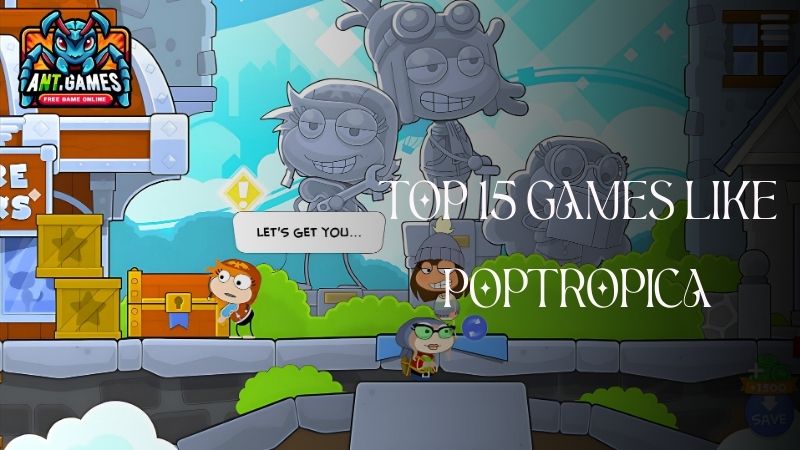School networks often block gaming sites, making it tough for students to play during breaks. But don’t worry – there are ways to bypass these restrictions safely and efficiently. Whether you use a VPN, proxy, mobile data, or unblocked game websites, you can regain access to your favorite games without hassle.
A VPN is the most secure option, encrypting your connection and masking your IP to bypass school firewalls. However, if VPNs are restricted, alternative methods like web proxies, mobile hotspots, and unblocked game sites can also help you play games on school computers.
In this article, AntGames will let you discover the best ways to unblock games at school, ensuring fast, safe, and reliable access. Whether you’re a casual player or just looking to pass time, these methods will help you enjoy gaming without breaking school rules. Let’s get started!
How to unblock games at school with VPN?
A Virtual Private Network (VPN) is a tool that creates a secure, encrypted connection between your device and a network. It safeguards sensitive data, blocks unauthorized access, and enables secure remote work. If you’re looking to unblock games at school, using a VPN is easy and fast, even if you’re a first-time user. Simply follow these steps:
- Step 1: Choose a Reliable VPN Provider – We recommend NordVPN for its fast and secure game access.
- Step 2: Download and Install the VPN App – Most providers offer apps for both desktop and mobile devices.
- Step 3: Log In and Connect to a Server – Pick a server close to your location for the best connection speed.
- Step 4: Start Playing! – Your favorite online games should now be accessible without restrictions.
- Step 5: Troubleshooting – If you still face issues, try clearing your browser cookies. If problems persist, contact the VPN’s customer support.

How to unblock games at school without VPN?
Playing games at school can be tricky due to network restrictions, but you don’t always need a VPN to bypass them. Schools often block gaming sites to prevent distractions, but there are alternative ways to access unblocked games while following school policies. Below are three effective methods to unblock games without using a VPN.
Use Mobile Data Instead of School WiFi
One of the easiest ways to bypass school network restrictions is to switch to mobile data. If your school blocks games on WiFi, using your smartphone’s hotspot can help you connect without restrictions. This method allows you to access gaming sites freely without relying on the school’s internet filters.
However, using mobile data has some downsides. Streaming or playing online games can consume a lot of data, which might lead to high charges if you don’t have an unlimited data plan. Also, some schools have policies against using personal hotspots, so be sure to follow school guidelines before trying this method.
Use Proxy on School Computer
A web proxy can act as an intermediary between your computer and a blocked website, allowing you to access games without being detected. Proxy sites work by rerouting your internet traffic through a different server, making it appear as if you’re browsing from an unrestricted network.
To use a proxy:
- Open a browser and search for free web proxy sites (e.g., Hide.me, ProxySite, or KProxy).
- Enter the game’s URL into the proxy search bar.
- Click Go or Enter, and the proxy will load the game for you.
Keep in mind that many schools block proxy sites, so you may need to try multiple options. Some free proxies also slow down internet speeds or display ads, which can impact gameplay.
Use Unblocked Game Websites on School WiFi
Some gaming platforms specialize in unblocked games that work even on restricted networks. Websites like AntGames, CoolMathGames and HoodaMath offer browser-based games that don’t require additional software or downloads. Since these sites are often categorized as educational or puzzle-based, they may not be blocked by school filters.
To access these sites:
- Open a web browser on your school computer.
- Search for “unblocked games” or visit trusted platforms like AntGames
- Click on a game and start playing.
How to play browser games on a school computer?
Accessing browser games on school computers can be tricky due to network restrictions, but there are ways to work around these limitations. The key is to prioritize games that don’t require extra plugins or downloads, as these are often blocked by school firewalls. Stick to reputable websites that use HTTPS encryption to ensure your safety while gaming.
Always follow your school’s computer usage policies. Opt for educational, puzzle, or cognitive games that are less likely to raise alarms with administrators. Play games during free periods or lunch breaks to avoid disrupting your academic work.
HTML5-based games are a good choice, as they often bypass traditional restrictions. You can also explore cloud-based gaming platforms or proxy servers, but use them carefully to avoid consequences. Virtual Private Networks (VPNs) can also be an option, but they may violate school policies, so proceed with caution.

See More: Good free online games to play with friends
Popular online gaming website for playing unblocked games at school
When looking for online gaming websites with unblocked games at school, AntGames is a top choice. We offer a wide range of free, browser-based games across multiple genres, perfect for students during breaks or free periods. No downloads are needed, so students can easily access games directly from their browsers on school computers.
AntGames is known for its diverse selection of game genres. Whether you enjoy action, strategy, or fast-paced fun, there’s something for everyone. We currently focus on five key genres: action games, arcade games, driving games, shooting games and skill games, each providing unique experiences from exciting battles to mind-sharpening puzzles.
In addition to entertainment, AntGames helps improve cognitive and problem-solving skills. Skill-based games boost focus, coordination, and strategic thinking—skills useful both in the classroom and everyday life. For example, puzzle games improve critical thinking, while driving and arcade games enhance hand-eye coordination and reaction times.

Why do schools block online games?
Educational institutions implement game-blocking measures to maintain a focused learning environment and mitigate digital distractions during instructional time. These internet restrictions are part of broader school policies aimed at fostering student engagement with academic content and promoting digital citizenship.
Administrators and educators express concerns about gaming addiction and its potential deleterious impact on learning outcomes and academic performance. They posit that by limiting access to online games and entertainment platforms, students will be more likely to concentrate on their studies and engage in productive learning activities.
However, this approach often overlooks the potential benefits of video games in developing digital literacy skills and enhancing cognitive abilities. Many education experts and pedagogical researchers argue that a blanket ban on games fails to address the root causes of distraction and may even hinder students’ technological growth and 21st-century skill development.

How to unblock games on school Chromebook?
Accessing restricted content on educational Chromebooks without using Virtual Private Networks (VPNs) requires creative approaches. Three ethical methods to bypass Chromebook security and educational gaming policies include:
- Using alternative browsers like Tor or Opera, which offer built-in privacy features that can bypass filters while ensuring student anonymity.
- Modifying DNS settings to bypass content filters, unblocking access to educational games and websites, enhancing the learning experience.
- Using proxy websites or browser extensions to mask browsing activity, granting access to blocked content while maintaining privacy and adhering to policies.

How to unblock games on a school computer?
Accessing blocked games on school computers can be tricky, but there are strategies that don’t require installing software or using VPNs. You can use browser extensions, web-based proxy servers, or web caches as lightweight proxies to bypass restrictions. Alternatively, using your smartphone as a mobile hotspot can create an unrestricted network.
Consider using secure shell (SSH) tunneling for encrypted connections or exploring cloud-based gaming services. Portable applications and text-based games may also bypass content filters. Always prioritize ethical considerations and follow your school’s acceptable use policies to avoid disciplinary actions.
Explore more: Best free pc games

How to unblock games at school using your personal device?
To unblock games at school using your personal device, you can use a mobile hotspot, creating a private network free from school restrictions, but be mindful of data usage and device security. You can also modify your Domain Name System (DNS) settings to bypass basic blocks, though it may affect privacy. If parental controls are limiting access, try resetting your device or using guest mode temporarily. Lastly, explore unblocked platforms like browser-based games or lesser-known app stores. Always prioritize safety and follow school policies.

See more: Video game age ratings
How can you test VPNs for unblocking games on a school computer
When evaluating virtual private networks (VPNs) for circumventing restrictions on educational institution computers, you should prioritize crucial attributes such as robust encryption protocols, high-speed connections, and the capability to bypass stringent network firewalls.
You can conduct a comprehensive assessment of several reputable VPN services, analyzing their performance metrics, cybersecurity features, and impact on gaming latency. After meticulous testing, ExpressVPN emerged as the preeminent choice, excelling across all evaluation criteria.
VPN not working on a school computer: solutions
If a VPN isn’t working on a school computer, first check your internet connection and VPN credentials. Update your VPN client or switch to protocols like OpenVPN or IKEv2 if needed. Schools often block VPNs for security reasons, so consider alternatives like proxy servers or the Tor network, ensuring compliance with the school’s Acceptable Use Policy.
Antivirus or firewall software might also interfere, so disabling them temporarily may help. For persistent issues, contact your VPN provider for solutions like obfuscated servers or stealth protocols. Key considerations include network security, encryption, and data privacy to navigate restrictions effectively.
What are the best VPNs for unblocking games on a school computer?
Below are some of the best VPNs for unblocking games on a school computer, offering strong security features and seamless performance.
- NordVPN: A VPN service that protects your online privacy by encrypting your internet traffic and hiding your IP address. It offers over 6000 servers in over 110 countries and connects up to six devices at once. It also supports streaming on platforms like Netflix and Amazon Prime.
- Surf Shark: A VPN service that secures your online activity by masking your IP address. It offers features like unlimited device connections, strong encryption, a kill switch, and a no-logs policy. Surf Shark provides over 3200 servers in 100+ countries, which is highly affordable and suitable for households.
- IPVanish: Boasts 3,000 servers in 100+ countries, with 160 server locations, this VPN protects your online privacy by encrypting your internet connection and concealing your IP address. It provides secure browsing, bypasses geo-restrictions, and offers features like unlimited device connections, fast speeds, and no data logs.
- Proton VPN: A secure VPN service designed to protect your online privacy by encrypting your internet traffic and hiding your IP address. This VPN covers over 3800 servers in 85+ countries and is known for its strong focus on security and transparency. It also offers features like a no-logs policy, secure core servers for extra protection, and a free plan with no data limits.
- PureVPN: PureVPN has over 6500 servers in more than 70 countries. This VPN hides your IP address and encrypts your internet traffic to protect your online activity. Strong encryption, a kill switch, split tunneling, and a no-logs policy are some of its characteristics. PureVPN is well-known for enabling safe browsing on any network, avoiding geo-restrictions, and protecting online privacy.

Overall, AntGames hopes this article will help you understand why schools block online games and give some primary methods to unblock games with ease. In 2024, students have multiple strategies to circumvent digital restrictions and access games on school computers. While utilizing virtual private networks (VPNs), browser extensions, or educational gaming platforms can be effective, it’s crucial to adhere to institutional policies and ethical guidelines.
Balancing recreational activities with academic responsibilities is paramount; therefore, judicious use of gaming during appropriate breaks is recommended. If you want to experience more fantastic games, visit AntGames now for free.





